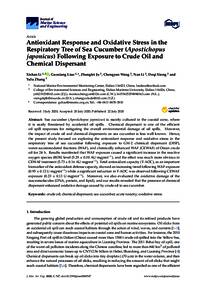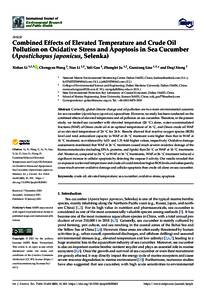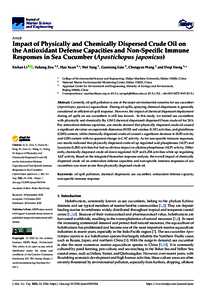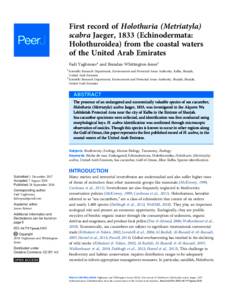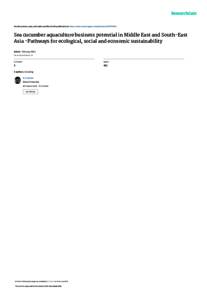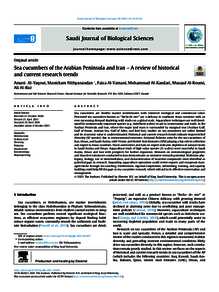وثيقة
Antioxidant response and oxidative stress in the respiratory tree of sea cucumber (apostichopus japonicus) following exposure to crude oil and chemical dispersant.
المعرف
DOI: 10.3390/JMSE8080547
المصدر
Journal of Marine Science and Engineering. v. 8, 8, 547
المساهمون
Liao, Guoxiang., مؤلف
Ju, Zhonglei., مؤلف
Wang, Chengyan., مؤلف
Li, Nan., مؤلف
Xiong, Deqi., مؤلف
Zhang, Yulu., مؤلف
الدولة
Switzerland
مكان النشر
Basel
الناشر
MDPI AG.
ميلادي
2020-08-01
اللغة
الأنجليزية
الملخص الإنجليزي
Sea cucumber (Apostichopus japonicus) is mainly cultured in the coastal zone, where it is easily threatened by accidental oil spills. Chemical dispersant is one of the efficient oil spill responses for mitigating the overall environmental damage of oil spills. However, the impact of crude oil and chemical dispersants on sea cucumber is less well known. Hence, the present study focused on exploring the antioxidant response and oxidative stress in the respiratory tree of sea cucumber following exposure to GM-2 chemical dispersant (DISP), water-accommodated fractions (WAF), and chemically enhanced WAF (CEWAF) of Oman crude oil for 24 h. Results manifested that WAF exposure caused a significant increase in the reactive oxygen species (ROS) level (5.29 0.30 AUmgprot-1), and the effect was much more obvious in CEWAF treatment (5.73 ± 0.16 AUmgprot-1). Total antioxidant capacity (T-AOC), as an important biomarker of the antioxidant defense capacity, showed an increasing trend followingWAF exposure (0.95 ± 0.12 Umgprot-1) while a significant reduction in T-AOC was observed following CEWAF exposure (0.23 ± 0.13 Umgprot-1). Moreover, we also evaluated the oxidative damage of the macromolecules (DNA, protein, and lipid), and our results revealed that the presence of chemical dispersant enhanced oxidative damage caused by crude oil to sea cucumber.
ISSN
2077-1312
URL المصدر
قالب العنصر
مقالات الدوريات

